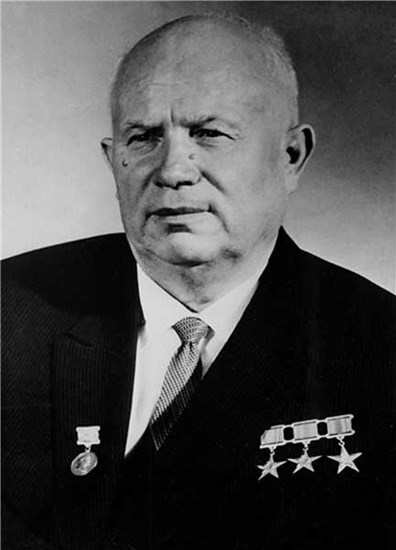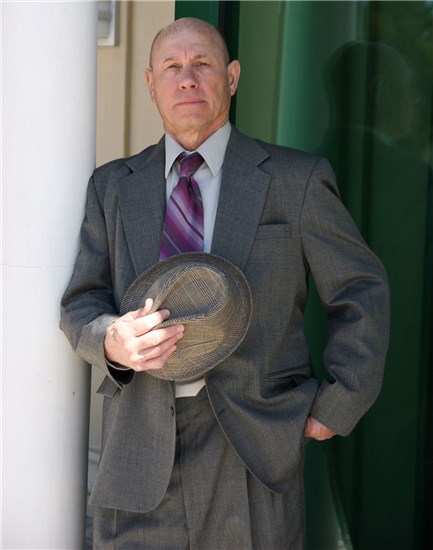

Nikita Khrushchev (1894-1971)
by Doug Mishler
Often remembered merely as a blowhard or a buffoon for his surreal kitchen debate with Nixon in 1959, his pouting over his failure to get into Disneyland, or his petulant shoe pounding at the UN, in fact Khrushchev was never a joke. Born in a tiny Ukrainian village in the 19th century and trained as a metal worker, Khrushchev followed a long and very colorful path to become arguably the most crucial figure opposing the West during the Cold War—certainly his Cuban missile adventure almost brought us nuclear war! An intimate of both Lenin and Stalin he amazingly survived their purges, yet he was also a hero of the great war against the Nazis, and then led the Soviet Union through the darkest and most dangerous hours of the Cold War from 1954 to 1964 (which dangers he in large measure created). Khrushchev was a remarkable figure in American history.
Khrushchev can be seen as a fool or a demon: in truth he was both. He could act with a smile and play the fool for the American media “radiating energy but not intellect,” and then turn around and take the world to the brink of a nuclear holocaust over missiles in Cuba. He was profoundly earthy and even obscene in his language, yet he also loved the ballet and the symphony. He was poorly educated and so underestimated by many Russians and Americans as “not very bright,” but he was also incredibly impetuous and calculating. And while he was a devout communist, he was also devoutly Russian.
He could be childish and was loyal to friends, and yet he was also ruthless. He sentenced thousands to death, but lamented doing so. He reveled in the police state, but also instituted complex liberal reforms that slowly opened up the U.S.S.R.; pushed de-Stalinization; and even liberated Soviet art (not modern art which he called “dog shit…a donkey could smear better art with its tail"). He also drove the USSR forward in accruing nukes, launching Sputnik, and initiating the manned space race, while desperately trying to improve living conditions in the USSR and disarm the world! His accomplishments were remarkable for a nation reeling from carnage of WWII and the costs the Cold War.
He joined Lenin’s communists early on and fought in the revolution. Later he happily carried out Stalin’s murderous purges in the 1930s for as he said, Only one word is suitable for the mercenary, fascist dogs of the Trotskyite gang…execution.” He fought valiantly during the horrific Nazi siege of Kiev and Stalingrad, and even survived Stalin’s darkest days after the war, "When Stalin says dance, a wise man dances." He then very astutely and powerfully muscled and maneuvered his way past the cold calculating killers Beria, and Malenkov, to take power in 1954 after Stalin died, “Comrades, we must unmask and relentlessly destroy all enemies of the people.”
Yet for the United States it was for his Cold War role that Khrushchev is best remembered. For a decade he flamboyantly went toe to toe with the Americans in Berlin, Africa, Middle East, Asia, Cuba, and even space. He went “eyeball to eyeball” building walls, shipping missiles, and running tanks through American checkpoints even though during those years the Soviet’s actual power was incredibly weak. In fact, Khrushchev’s greatest Cold War achievement was to convince the West that the U.S.S.R. was stronger than it really was: “We have all the rockets, of whatever capacity, that we need,” (when in fact he had 7 to the US 150!). His histrionics and tantrums often were aimed to bluff America such as much quoted statement, “We will bury you.” He was a devout patriot and, so he intrigued, armed, spied, undermined, or launched rockets all in order to oppose what he saw as the U.S. encroachment that threatened his country.
To defend his homeland from perceived Western attack he ruthlessly crushed the Polish uprising in 1956 as well as his bloody destruction of the 1956 Hungarian uprising. For Soviet gain he at first aided China but by 1956 he and Mao became more and more confrontational and so Khrushchev cut off all aid. In fact, in 1959 on the verge of giving China the H-bomb, Krushchev backtracked and destroyed it and all the documents.
In one of the great theatrical events of the Cold War, flamboyant Krushchev sparred with Nixon over appliances and the strengths of Soviet washing machines. In another piece of public theater, he was the first Soviet leader to visit the U.S., though he was angered by not being allowed to visit “that capitalist banality” Disneyland. These two events warmed the Cold War for a moment and a summit with Eisenhower was planned to create détente and he hoped cause world wide disarmament. Then in early 1960 Gary Powers’ U2 spy plane was shot down and the demonic and very angry Krlushchev appeared, and the Cold War became icy again. The summit was a fiasco and soon at the U.N. Krushchev pounded his shoe to denunciate the Filipino leader as “a fawning lackey of the American imperialists."
The Cold War grew even colder and more dangerous. First Krushchev’s men brilliantly launched the world’s first manned space flight. This gave Krushchev more theatrical ammunition which he played to the hilt: “Communist scientists benefit mankind; capitalist scientists exploit their people.” Soon Soviet mockery of the U.S. was enhanced by JFK’s humiliation at the Bay of Pigs. Sensing JFK was weak (“that little shit”) and pressing a short-cut to overcome the U.S. missile gap, Khrushchev upped the stakes, and heightened tensions, in 1962, by first establishing the Berlin Wall and then nearly starting Armageddon with the Cuban Missile Crisis.
Yet ultimately this near planetary death in 1962 chastened Krushchev. His fear and JFK’s softening stance led to a major achievement, the Nuclear Test Ban Treaty. Krushchev needed this treaty as he knew the arms race was wrecking his nation’s economy. For years he had been secretly shrinking the Soviet army and cutting down on conventional armaments to save money, but he also was sincerely scared of a Nuclear War.
Khrushchev though never gave up his steady intrigue against the U.S.: he invited Ho Chi Minh to Moscow, supported Nasser in Egypt against Israel, and supported third world leaders in what he called “the people’s struggle against the imperialist West.” What he wanted though was peaceful competition with the West not war.
In 1964 Brezhnev deposed Khrushchev in a bloodless coup. While Nikita saw it coming he told a friend, “I'm old and tired. Let them cope by themselves. I've done the main thing. Could anyone have dreamed of telling Stalin that he didn't suit us anymore and suggesting he retire? Not even a wet spot would have remained where we had been standing. Now everything is different. The fear is gone, and we can talk as equals. That's my contribution. I won't put up a fight.”
Khrushchev amazingly was the first Soviet leader to retire and remain alive. He lived his last 7 years in mediocre comfort (but good by Russian standards), but he was watched and ostracized. He wrote his memoirs and secretly had them published in the West though he was forced to publically state they were a fraud. In 1971 the old Cold Warrior died from a heart attack and was denied a state funeral or Kremlin burial.
As one historian noted, “Khrushchev opened the doors and windows of a petrified structure. He let in fresh air and fresh ideas, producing changes which time already has shown are irreversible and fundamental.” Whatever his legacy in Russia it is clear that his legacy to the United States will always be as the Soviet’s fiercest warrior during the coldest times of the Cold War.
Recommended Reading
Aleksandr Fursenko & Timothy Naftali. Khrushchev’s Cold War, 2006.
Khrushchev, Nikita. Khrushchev Remembers: The Last Testament, 1974.
Taubman, William. Khrushchev: The Man and His Era, 2003.
Doug Mishler
For over 20 years Doug has been nationally recognized for bringing “history to life.” Doug has presented figures from Nikita Khrushchev to Theodore Roosevelt, to Ernie Pyle, and P. T. Barnum. He has made over 800 first person presentations of over 20 historical figures, including Stonewall Jackson, Henry Ford, and now Isaac Parker. The voices in his head keep him busy, but he also has his own theatre company “RAT,” and also teaches history at the University of Nevada. Like his idol T. R., Doug believes there is still plenty of time to grow up and get a “real job”—but later!
Bullet Points
-
The face of the Cold War's Red Menace.
-
The father of the Berlin Crisis
-
The architect of the Cuban missile crisis
-
Denied access to Disneyland
Survived Stalin.
Quotes
“Only one word is suitable for the mercenary, fascist dogs of the Trotskyite gang…execution.”
"When Stalin says dance, a wise man dances."
“We will bury you.”
Presented with a watch by U.S. diplomat: “It looks like some infernal machine that the capitalists have dreamed up to blow up the communist world. I will tell my wife to try it on first.”
“We may not love each other, but we have to live together…if the world is to survive.”
“If there is no threat, then armaments are a burden.”
“We will not be simple bystanders with regard to American piratical acts.”
“Kennedy sleeps with a wooden knife, for when a man goes bear hunting for the first time he takes a wooden knife so that cleaning his soiled trousers will be easier.”
“There is no doubt that Kennedy has turned into a coward.”
“The Soviet people want only peace and yet the Americans have attacked us by invading our space with their spy planes!”
“I was horrified to hear that Eisenhower endorsed these acts of aggression.”
“You must understand that we Russians go whole hog; when we play, we play and when we fight, we fight!”
“JFK is a little shit.”
“America continues to threaten the world since it is run by militarists and imperialists.”
“Missiles are not cucumbers…one cannot eat them, they have little value.”
“Even in the life of people who have committed crimes there comes a moment when they can admit it.”
“We did everything to shield Stalin, yet we were shielding a criminal, a murderer.”
“The devil knows what type of nonsense this is.” (Eisenhower excuses for U-2)
Timeline
1894 - Born April 17 in Kalinovka, Kursk Province.
1912-18 - Worked as a metal fitter.
1918 - Joined the Bolsheviks.
1924 - Married Nina Petrovna.
1922-34 - Rose through party ranks and elected to the Central Committee at the Seventeenth Party Congress in 1934.
1939 - Made full member of Politburo.
1941-43 - Served as a political commissar on various fronts during the war with the rank of lieutenant general.
1947 - Accused of insufficient vigilance in stamping out nationalism in Ukraine. Relieved of position as First Secretary of Ukraine, and nearly executed (Restored the following year).
1949 - Made head of Moscow & also controller of agriculture.
1953 - Became First Secretary of the party after Stalin's death.
1954 - Virgin Lands campaign.
1955 - Consolidated power.
1956 - Secret speech to 20th Party Congress that denounced Stalin & the “cult of personality.”
1957 - Wins another power struggle.
1957 - First sputnik launched.
1958 - Assumed the role of chairman (Premier) of the Soviet of Ministers as well as party leader, now total power.
1960 - U-2 spy plane piloted by F.Gary Powers shot down.
1960 - Addressed the U.N. General Assembly in New York.
1961 - Met Kennedy in Vienna.
1961 - Yuri Gagarin became the first man in space.
1961 - Stalin's body removed from Kremlin.
1962 - Cuban missile crisis begins in October.
1963 - Nuclear test-ban treaty signed.
1964 - Deposed by Leonid Brezhnev, et al, in October in the Little October Revolution.
1971 - Died on September 11.